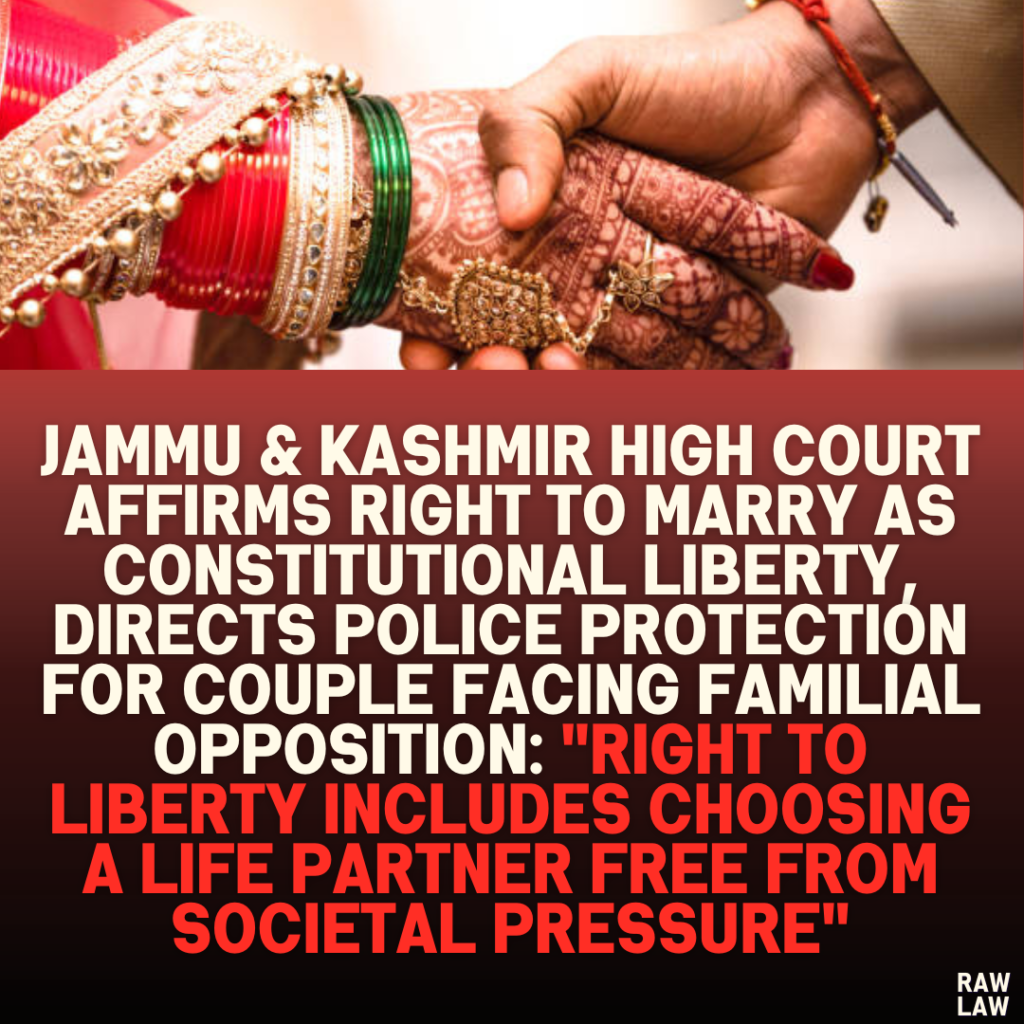Court’s Decision:
The Jammu & Kashmir High Court granted protection to a couple who married against their families’ wishes, directing authorities to ensure their safety. The court highlighted the constitutional right of adults to choose their life partners, emphasizing that any infringement of this right constitutes a violation of constitutional principles. The court specified that protection be provided per Supreme Court precedents, subject to verification of the couple’s majority and legal compliance of the marriage.
Facts:
The petitioners, both adults, married of their own volition and are living as husband and wife. They approached the court, seeking protection from their families, who opposed the marriage and posed potential threats to their safety.
Issues:
- Whether the petitioners, having exercised their right to marry by mutual consent, are entitled to protection from threats posed by family members.
- Whether the state has an obligation to ensure the safety and dignity of individuals who exercise their constitutional right to choose their life partner.
Petitioner’s Arguments:
The petitioners argued they are entitled to protection under Articles 19 and 21 of the Indian Constitution, which safeguard individual autonomy and liberty, including the freedom to marry a person of choice.
Respondent’s Arguments:
The respondent authorities were instructed to verify the petitioners’ ages and the legality of the marriage before providing protection. The court emphasized that, should any FIR be registered, police investigations must follow due legal process.
Analysis of the Law:
The court relied on constitutional provisions under Articles 19 and 21, which protect individual autonomy, liberty, and the right to dignity. Additionally, it referenced the Supreme Court rulings in Lata Singh v. State of U.P. and Shakti Vahini v. Union of India, which assert the state’s duty to protect couples who face social opposition due to their choice of partner.
Precedent Analysis:
- Lata Singh v. State of U.P. – This case underscored the rights of adults to marry by personal choice, without interference from familial or societal forces.
- Shakti Vahini v. Union of India – The court reaffirmed that individuals who marry against societal or family opposition have a constitutional right to protection.
Court’s Reasoning:
The court observed that the petitioners’ decision to marry is an extension of their autonomy and personal liberty, protected by the Constitution. The right to choose one’s partner is a part of one’s dignity, and any hindrance to this choice constitutes a violation of personal liberty. The court stated that individual choice in marriage cannot be subject to societal or familial pressure, as such interference erodes the fundamental rights guaranteed under constitutional law.
Conclusion:
The High Court ordered the state authorities to provide necessary protection to the petitioners. This order is subject to verification of the petitioners’ majority and the lawful solemnization of the marriage. It clarified that the judgment does not authenticate the petitioners’ marriage or verify their age, which remain subject to applicable legal requirements.
Implications:
This decision reinforces the constitutional mandate to uphold individual rights to autonomy and personal choice, particularly in matters of marriage. It sets a precedent for other cases involving individuals facing opposition from family or community due to personal life choices. The court’s emphasis on Articles 19 and 21 underscores the judiciary’s commitment to safeguarding personal liberty against social or familial coercion.



